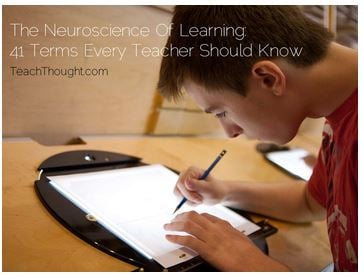Special Ed Corner: The Neuroscience Of Learning: 41 Terms Every Teacher Should Know
by Judy Willis M.D., M.Ed., radteach.com

As education continues to evolve, adding in new trends, technologies, standards, and 21st century thinking habits, there is one constant that doesn’t change.
The human brain.
But neuroscience isn’t exactly accessible to most educators, rarely published, and when it is, it’s often full of odd phrasing and intimidating jargon. Worse, there seems to be a disconnect between the dry science of neurology, and the need teachers have for relevant tools, resources, and strategies in the classroom. In regards to the disconnect, we’ll continue to strive to create content that is both expert and accessible, as The Simple Things I Do To Promote Brain-Based Learning In My Classroom
As for the jargon, Judy Willis, teacher, neuroscientist, and consultant has put together an A-Z glossary of relevant neuroscience terms for teachers and administrators to help clarify the jargon. Willis’ writing has been published on edutopia, TeachThought, and Psychology Today, among other sites, and her work in this field has been especially relevant at a time of such great change in education.
The best approach with a list like this is to bookmark and share the page, and comeback to it intermittently. We’ll also add it as its own page later this week.
Read the Rest of this Article on Teach Thought.com
dup 72619
PediaStaff is Hiring!
All JobsPediaStaff hires pediatric and school-based professionals nationwide for contract assignments of 2 to 12 months. We also help clinics, hospitals, schools, and home health agencies to find and hire these professionals directly. We work with Speech-Language Pathologists, Occupational and Physical Therapists, School Psychologists, and others in pediatric therapy and education.
